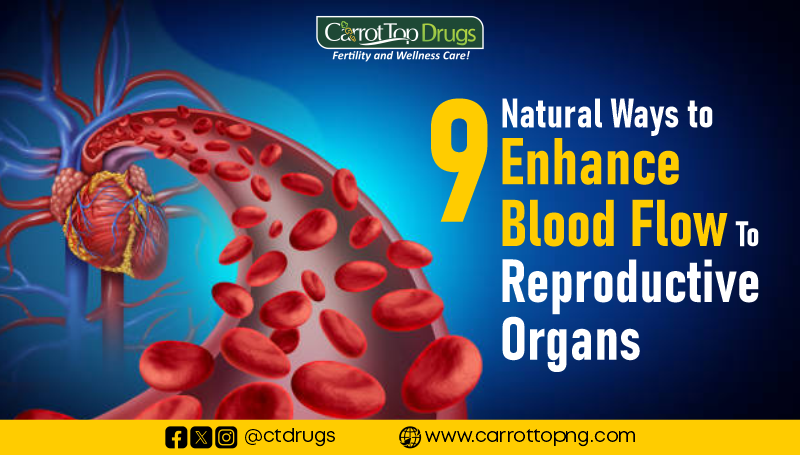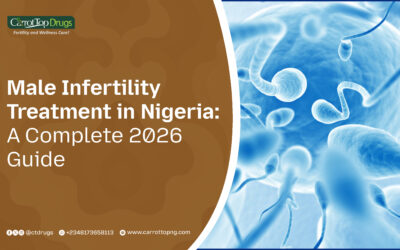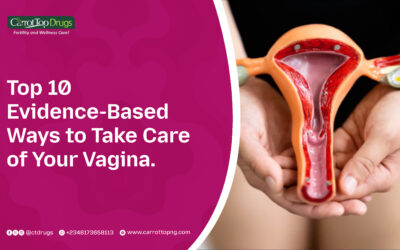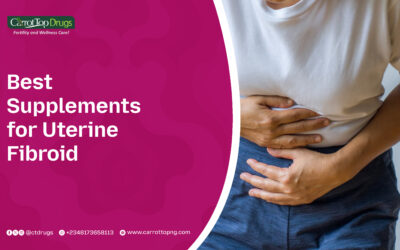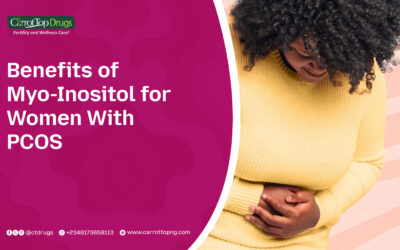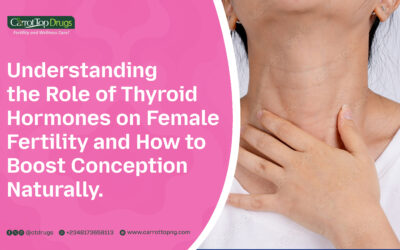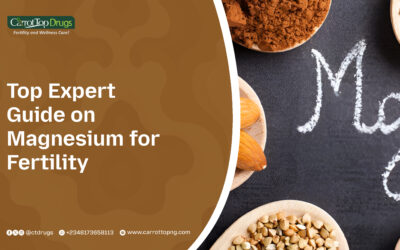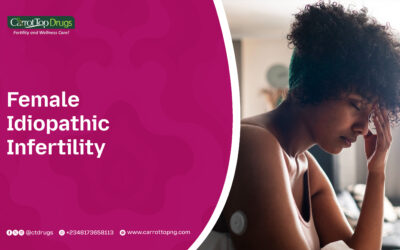Introduction
Blood flow to the reproductive organs is essential for maintaining reproductive health and function. Proper circulation ensures the delivery of oxygen and nutrients, removes waste products, and supports hormone delivery. This article will explore the implications of poor blood flow, present relevant fertility statistics, and detail natural ways to enhance blood flow to reproductive organs.
The Importance of Blood Flow to Reproductive Organs in Male and Female Fertility
Blood flow to the reproductive organs is crucial for maintaining fertility in both men and women. Adequate circulation ensures the delivery of essential nutrients, oxygen, and hormones while removing metabolic waste products. This article explores the significance of blood flow in reproductive health and its impact on fertility for both sexes.
Importance of Blood Flow in Male Fertility
Spermatogenesis:
Blood flow to the testes is vital for spermatogenesis, the process of sperm production. The testes require a steady supply of nutrients and oxygen to support the development and maturation of sperm cells. Poor blood flow can impair this process, leading to reduced sperm count and quality..
Erectile Function:
Adequate blood flow is necessary for achieving and maintaining an erection. Erections result from increased blood flow into the erectile tissue of the penis, facilitated by the dilation of blood vessels. Insufficient blood flow can lead to erectile dysfunction (ED), which directly impacts the ability to engage in sexual intercourse and consequently affects fertility (Jackson et al., 2005).
Hormonal Regulation:
Blood flow is essential for the distribution of hormones such as testosterone, which plays a critical role in male reproductive health. Poor circulation can disrupt hormonal balance, affecting libido, sperm production, and overall reproductive function (Sharpe, 2014).
Importance of Blood Flow in Female Fertility
Ovarian Function:
The ovaries rely on a rich blood supply to support the development and release of eggs. Adequate blood flow ensures that the ovaries receive the necessary hormones and nutrients to maintain healthy ovulation cycles. Poor blood circulation can lead to anovulation (lack of ovulation) or poor egg quality, reducing fertility.
Uterine Health:
Blood flow to the uterus is crucial for the development and maintenance of the endometrial lining, which is essential for embryo implantation. A well-vascularized uterine lining provides the optimal environment for a fertilized egg to implant and grow. Insufficient blood flow can result in a thin or inadequately developed endometrial lining, making implantation difficult and increasing the risk of miscarriage..
Menstrual Regularity:
Proper circulation supports the hormonal regulation necessary for regular menstrual cycles. Disruptions in blood flow can lead to irregular periods, amenorrhea (absence of menstruation), and other menstrual disorders that can impact fertility.
Implications of Poor Blood Flow to Reproductive Organs
Poor blood flow to the reproductive organs can lead to several health issues, including:
Erectile Dysfunction (ED) in Men
Erectile Dysfunction (ED) is a common condition that can be significantly influenced by blood flow to the penis. When blood flow is inadequate, it can impair the ability to achieve and maintain an erection firm enough for sexual activity. Erections occur when the penis fills with blood, causing it to become rigid. This process, known as tumescence, relies on sufficient blood flow into the erectile tissue of the penis, specifically the corpus cavernosum.
How Reduced Blood Flow Contributes to Erectile Dysfunction:
Vascular Damage: Conditions such as atherosclerosis (narrowing of arteries due to plaque buildup) can restrict blood flow to the penis. This reduces the amount of blood available to fill the erectile tissue during arousal, leading to difficulty in achieving an erection.
Endothelial Dysfunction: The endothelium, a thin layer of cells lining blood vessels, plays a crucial role in regulating vascular tone and blood flow. Damage or dysfunction of these endothelial cells can impair the ability of blood vessels in the penis to dilate and allow adequate blood flow during arousal.
Nitric Oxide Production: Nitric oxide (NO) is a key signaling molecule involved in the relaxation of blood vessels, allowing increased blood flow. Reduced production or availability of NO can contribute to erectile dysfunction by impairing the vasodilation necessary for achieving and maintaining an erection.
Chronic Conditions: Medical conditions such as diabetes, hypertension (high blood pressure), and metabolic syndrome can all contribute to endothelial dysfunction and impaired blood flow, increasing the risk of erectile dysfunction.
Infertility in Women:
Insufficient blood flow to the ovaries and uterus can have profound implications for female fertility. The ovaries rely on adequate blood supply to support the growth and development of follicles, which contain the eggs. Without sufficient blood flow, the ovaries may not receive the necessary oxygen and nutrients, impacting the quality of the eggs produced. Poor egg quality can hinder fertilization and reduce the chances of successful embryo development.
Mechanisms of Impaired Blood Flow in Female Infertility:
Ovarian Function:
The ovaries require a rich blood supply to ensure optimal hormone production and follicular development. Reduced blood flow can disrupt these processes, leading to irregular ovulation or poor egg quality.
Uterine Lining:
Adequate blood flow to the uterus is crucial for the development of a thick, healthy endometrial lining. Insufficient blood flow can result in a thin or inadequate lining, making it difficult for a fertilized egg to implant and establish a pregnancy.
Hormonal Imbalance:
Blood flow plays a role in the regulation and distribution of hormones essential for reproductive function. Disruptions in blood flow can contribute to hormonal imbalances that affect ovulation and the menstrual cycle.
Decreased Libido:
Poor circulation can have a direct impact on sexual arousal and libido in both men and women. Libido, or sexual desire, is influenced by various physiological factors, including hormonal balance, neurotransmitter activity, and overall physical health. Adequate blood flow plays a crucial role in supporting these factors and promoting sexual arousal.
Mechanisms of Decreased Libido Due to Poor Circulation:
Blood Flow to Sexual Organs:
In men, sufficient blood flow to the penis is necessary to achieve and maintain an erection. Reduced circulation can lead to erectile dysfunction, which may diminish sexual interest and arousal. Similarly, insufficient blood flow to the genitals in women can affect vaginal lubrication and sensation, potentially reducing sexual desire.
Hormonal Imbalance:
Circulation is vital for the distribution of hormones involved in sexual function and desire. Poor circulation can disrupt the production and release of hormones such as testosterone in men and estrogen in women, both of which are crucial for sexual arousal.
Neurological Factors:
Blood flow delivers oxygen and nutrients to the brain and nervous system, supporting neurotransmitter activity involved in sexual response. Diminished circulation may impair nerve function and neurotransmitter release, affecting sexual arousal and pleasure.
Menstrual Irregularities:
Inadequate blood flow to the reproductive organs can significantly impact the menstrual cycle in women, potentially leading to various menstrual irregularities. The menstrual cycle is regulated by a complex interplay of hormones and physiological processes, all of which depend on sufficient blood circulation to the ovaries, uterus, and related structures.
Mechanisms of Menstrual Irregularities Due to Poor Blood Flow:
Ovulation Disorders:
Adequate blood flow to the ovaries is essential for the development and release of mature eggs during ovulation. Insufficient circulation can disrupt this process, leading to irregular or absent ovulation.
Uterine Function:
The uterus requires adequate blood supply to maintain a healthy endometrial lining. Inadequate blood flow can result in a thin or poorly developed uterine lining, which may affect the regular shedding and renewal process during menstruation.
Hormonal Imbalances:
Blood circulation is crucial for the distribution of hormones involved in the menstrual cycle, such as estrogen and progesterone. Poor circulation can contribute to hormonal imbalances that disrupt the normal pattern of menstruation.
Fertility Statistics Related to Poor Blood Flow
Fertility issues related to poor blood flow are significant. According to the World Health Organization (WHO), approximately 15% of couples globally experience infertility, with vascular issues being a contributing factor in many cases. Studies have shown:
Male Infertility: Erectile dysfunction affects about 30 million men in the United States alone .
Female Infertility: Up to 40% of infertility cases in women are linked to ovulatory disorders, which can be exacerbated by poor blood flow to the ovaries .
Natural Ways to Enhance Blood Flow to Reproductive Organs
Improving blood flow to the reproductive organs can be achieved through various natural methods:
1. Regular Exercise
One of the natural ways to enhance blood flow to reproductive organs is through exercise. Exercise improves cardiovascular health, which enhances overall blood circulation, including to the reproductive organs.
Aerobic Exercise:
Activities like walking, running, and swimming increase heart rate and blood flow.
Strength Training:
Builds muscle mass, supporting better blood circulation.
Yoga:
Specific poses, such as the bridge pose and bound angle pose, can increase blood flow to the pelvic area.
2. Healthy Diet
Another one of the natural ways to enhance blood flow to reproductive organs is via a healthy diet. A diet rich in certain nutrients supports vascular health and improves blood flow.
Leafy Greens:
High in nitrates, which convert to nitric oxide, a vasodilator that improves blood flow.
Berries:
Contain antioxidants that protect blood vessels.
Nuts and Seeds:
Provide healthy fats and magnesium, supporting vascular health.
Citrus Fruits:
Rich in vitamin C, which strengthens blood vessels.
3. Hydration
Adequate hydration maintains blood volume and improves circulation. Drinking at least 8 glasses of water a day ensures that the blood remains fluid and can circulate effectively.
4. Herbal Supplements
Certain herbs can act as vasodilators, improving blood flow. Some common ones are:
Ginkgo Biloba: They are anti-atherosclerotic agents that help to enhance blood flow to men’s penis and maintain a strong erection.
Garlic: Helps dilate blood vessels.
Ginger: Acts as a vasodilator.
Cinnamon: Improves blood flow by dilating blood vessels.
Our Evergreen Action for Men contains Ginseng, Epimedium sagittatum, Tribulus terrestris and
5. Massage Therapy
Massage stimulates blood flow through physical manipulation of tissues.
Abdominal and Pelvic Massage: Directly enhances circulation to reproductive organs.
Full-Body Massage: Promotes overall relaxation and improved circulation.
6. Avoiding Smoking and Excessive Alcohol
Smoking and excessive alcohol constrict blood vessels and impair circulation.
Quit Smoking: Improves vascular health.
Limit Alcohol: Ensures better blood flow.
7. Stress Management
Reducing stress lowers cortisol levels, which can improve blood flow.
Meditation and Deep Breathing: Reduce stress and improve circulation.
Adequate Sleep: Supports overall health and circulation.
8. Healthy Weight Management
Maintaining a healthy weight supports better circulation and reduces the risk of vascular problems. It is one of the natural ways to enhance blood flow to reproductive organs. A balanced diet and regular exercise help achieve and maintain a healthy weight.
9. Avoiding Tight Clothing
Tight clothing can restrict blood flow, particularly around the pelvic area. Wearing comfortable, loose-fitting clothes ensures better blood circulation.
Conclusion
Enhancing blood flow to the reproductive organs is crucial for maintaining reproductive health and fertility. Through regular exercise, a healthy diet, proper hydration, herbal supplements, massage therapy, acupuncture, avoiding smoking and excessive alcohol, managing stress, warm baths, healthy weight management, avoiding tight clothing, and maintaining proper posture, individuals can naturally improve circulation to these vital areas. These methods not only support reproductive health but also contribute to overall well-being.
FAQs
Q. How does exercise improve blood flow to the reproductive organs?
A. Exercise increases heart rate and promotes overall blood circulation, which enhances blood flow to the reproductive organs.
Q. What foods can help improve blood flow to the reproductive organs?
A. Leafy greens, berries, nuts, seeds, and citrus fruits are particularly beneficial for improving blood flow.
Q. Can hydration really impact blood flow?
A. Yes, staying hydrated helps maintain blood volume and fluidity, essential for effective circulation.
Q. Are there any specific yoga poses that help with blood flow to the reproductive organs?
A. Yes, poses like the bridge pose and bound angle pose can increase blood flow to the pelvic area.
Q. How do herbal supplements like ginkgo biloba and garlic improve blood flow?
A. Ginkgo biloba and garlic act as vasodilators, which help dilate blood vessels and improve circulation.
Q. What role does stress management play in blood flow?
A. Reducing stress through meditation, deep breathing, and adequate sleep can lower cortisol levels, which improves blood flow.
Q. Can massage therapy really make a difference?
A. Yes, both abdominal and pelvic massages directly stimulate blood flow to the reproductive organs.
[/et_pb_text][/et_pb_column][/et_pb_row][/et_pb_section]

